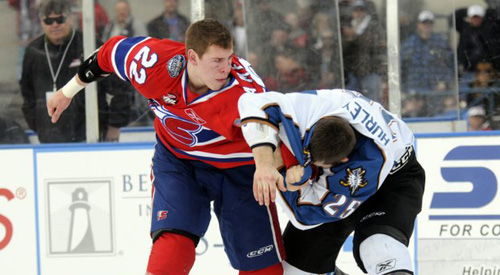
Darren Kramer fighting his way to the top
There have been countless cases in the sport of hockey when a player has been required to change the way he plays in order to make it to the next level.
Whether it’s changing their role from a scoring forward to a defensive forward, a stay-at-home defenseman to a two-way, or a skilled player into an enforcer, each candidate must do something unique in order to fit in on an NHL roster.
In the case of recent Ottawa Senators draft pick, Darren Kramer, it was the latter that brought him from playing at a Tier Two Junior A level to earning the recognition of an NHL hockey club.
“I had to do something in order to get to the level where I could be drafted, and I chose the physical side of the game,” the 19-year-old forward admitted.
Although fighting has been put under a microscope as of late, Kramer recognizes it as an individual choice, not a requirement.
“I chose to get more involved physically, and if I didn’t like it I would stop doing it,” he said. “Everyone has the choice, it’s your body and your life and as long as players have a mutual respect for one another I don’t see the problem with it.”
[php snippet=1]
For Kramer, the physical route began in 2008-09 when he notched 220 penalty minutes in 38 games with the Grande Prairie Storm of the Alberta Junior Hockey League (AJHL), before breaking out the following season with 19 goals, 11 assists and 311 penalty minutes in 58 games.
After two seasons playing tier two junior, the husky, physical forward caught the eye of the Spokane Chiefs in the Western Hockey League where he played 68 games in the 2010-11 season, finishing first in the league with 308 penalty minutes, while also adding 14 points.
“Everything happened so quickly, going from Tier Two Junior to Major Junior hockey and taking on the role that I did,” Kramer said. “But the team welcomed me with open arms and I think they gained a lot of respect for me right away knowing what my role was and that I was doing it for them.”
It’s easy to see why his teammates gained that respect, as Kramer finished the season with 46 fighting majors against some big-name enforcers earning him the runner up in the “Best in the West” voting for toughest player in the league.
“I finished second to Sena Acolatse by like three percent, but he has to be the toughest guy I’ve fought so I can’t argue there,” he joked. “But I have the utmost respect for him and all the guys I compete against; it’s not an easy job but someone has to do it.”
Similar to Los Angeles Kings rookie Kyle Clifford (who had a stellar playoff performance last year after earning a spot on the team due to his grit and willingness to drop the gloves), Kramer showed his versatility by helping the Chiefs with five goals and three assists in last year’s WHL playoffs.
“I didn’t score many goals, but when I did, they were important ones,” the 6’2″, 200-pounder stated. “When it comes to playoffs, it’s a grind and your team needs consistency through all four lines, so everyone has to step up and chip in at that time of year.”
Although Kramer realizes the extra effort needed during the postseason, he doesn’t neglect the need for hard work throughout the entire year.
“The dark hours is what we like to call it,” he laughed. “It’s the times when you’re in the gym while your friends are out having fun, and you sacrifice a lot but it’s worth every minute.”
Kramer’s relentless work ethic may have materialized when he came to the realization that climbing the ranks in the world of hockey doesn’t come without disappointments.
In his first year of midget, Kramer was cut from his hometown Triple-A team in Peace River, Alberta – a fate that may have led many others to give up on their dream.
“I still remember our midget coach telling me, ‘Krames, it’s for the best’,” he said of being cut.
“I was really disappointed, but I ended up playing Midget A that season, had a ton of fun and it really helped me develop my game.
“Then I made the Triple-A team the following year and led the team in points, so I think it’s important to never give up, keep working hard and good things can happen.”
Now just a couple of years later, Kramer finds himself playing in the most competitive junior hockey league in the world with a shot at earning a spot on an NHL roster – a prime example of why to never give up on your dreams.
[php snippet=1]

